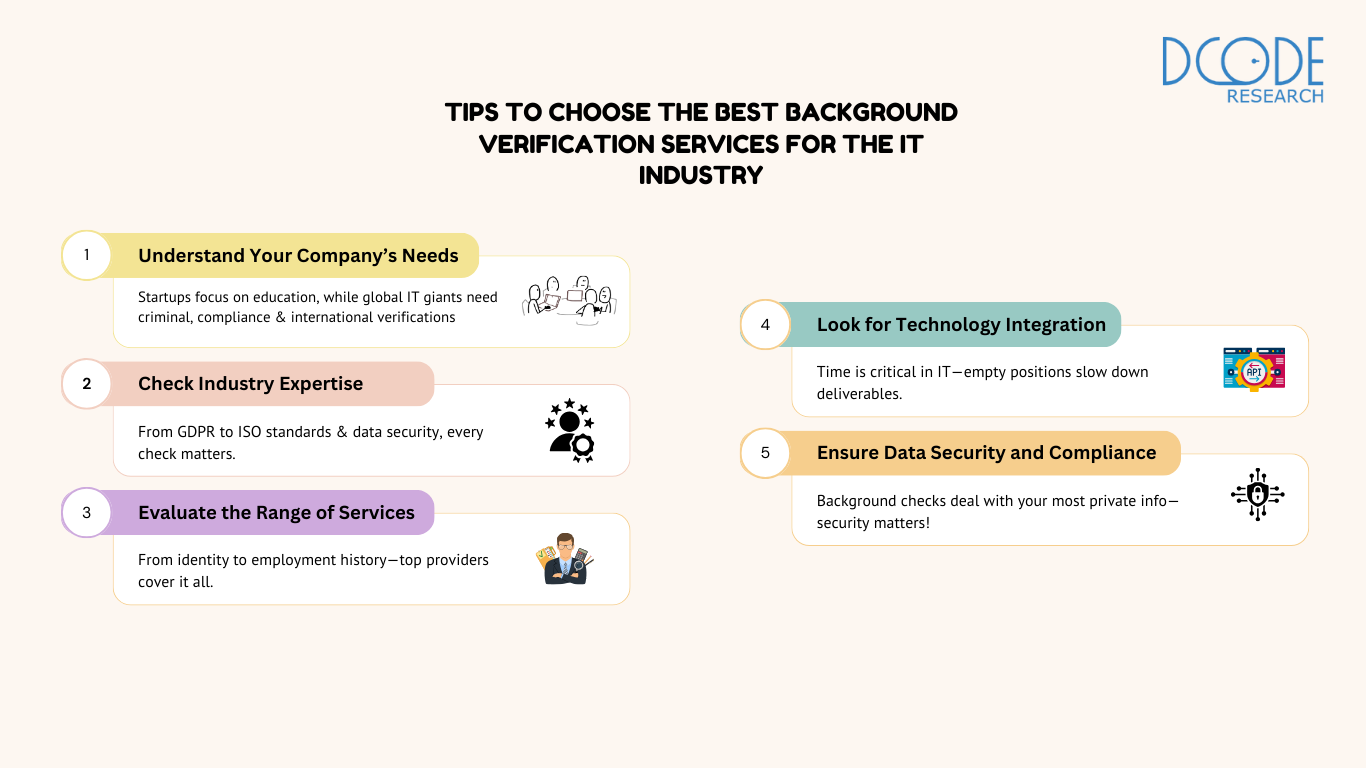In today’s competitive IT industry, hiring the right talent is more than just evaluating technical skills—it is about ensuring credibility, trustworthiness, and cultural alignment. With increasing cases of resume fraud, exaggerated work experience, and even identity theft, background verification (BGV) has become a crucial step in the recruitment process. Choosing the best background verification service can significantly reduce hiring risks and ensure your organization onboards genuine, skilled professionals.
Below are some practical tips to help IT industry companies choose the best background verification services:
1. Understand IT industry Company’s Needs
Every IT company has unique hiring requirements. A startup hiring fresh graduates may focus more on educational verification, while an established IT services company working with international clients may need global verification, criminal checks, and compliance-related checks. Before selecting a service provider, list your priorities—such as criminal record checks, past employment verification, reference checks, credit history, or address verification.
2. Check Industry Expertise
The IT sector has specific compliance needs like GDPR, ISO standards, and data security protocols. A service provider with prior experience in handling background verification for IT industry will better understand industry challenges and compliance requirements. Look for vendors who can verify candidates for roles such as software engineers, cybersecurity specialists, and project managers where trust and confidentiality are critical.
3. Evaluate the Range of Services
The best background verification providers offer a comprehensive suite of checks, such as:
- Identity verification
- Educational qualification verification
- Previous employment and role checks
- Reference checks from past employers
- Criminal record checks
- Address verification
- Drug and substance abuse tests (if required)
Choosing a provider with end-to-end services helps streamline the hiring process, saves costs, and ensures consistency across all verifications.
4. Look for Technology Integration
For IT companies, time is crucial—vacant positions delay projects and affect deliverables. Hence, a provider that uses advanced technology like AI-driven screening, API integrations, and real-time reporting can help speed up the process. Seamless integration with your HR management system (HRMS) ensures faster data flow and reduces manual effort.
5. Ensure Data Security and Compliance
Background verification involves handling sensitive candidate data such as personal identity, financial records, and legal information. IT companies must ensure that their chosen verification service provider complies with data protection laws like GDPR and India’s DPDP Act. Always ask about their data storage practices, encryption standards, and access protocols. A service provider with strong compliance guarantees minimizes the risk of data breaches.
6. Check Turnaround Time (TAT)
In IT hiring, speed matters as much as accuracy. A reliable BGV provider should strike the right balance—ensuring thorough verification without unnecessary delays. Ask about their average turnaround time and escalation procedures in case of delays. Ideally, most verifications should be completed within a week to align with IT industry hiring timelines.
7. Verify Credibility and Reputation
Before finalizing a provider, check their track record. Look for testimonials, case studies, and client references, especially from other IT companies. Reputable providers will have transparent processes and positive reviews highlighting their accuracy, professionalism, and customer service.
8. Scalability and Customization
As your IT company grows, your hiring needs will also expand. Choose a BGV provider capable of scaling their services—whether you need to verify ten candidates or a thousand. They should also offer customizable packages, so you pay only for the checks you require instead of unnecessary bundled services.
9. Cost Transparency
Cost plays a key role in selecting the right verification partner. Ensure the provider offers a transparent pricing structure without hidden charges. Compare multiple providers but remember that the cheapest option may not always guarantee accuracy or compliance. Strike a balance between affordability and service quality.
10. Post-Verification Support
Sometimes, verification reports may raise concerns or red flags about candidates. The right BGV provider should offer post-verification support to help HR teams interpret results and take informed hiring decisions. Strong customer support ensures clarity and helps maintain hiring confidence.
Conclusion
For IT industry, background verification is not just a formality—it’s an investment in workplace safety, compliance, and long-term productivity. By choosing a service provider with strong industry expertise, reliable technology, robust compliance measures, and scalable solutions, organizations can reduce hiring risks and build a trustworthy workforce. A careful selection today will save future challenges and help your IT company maintain its credibility and efficiency.
Also Read: Trusted partner for Background verification services
Frequently Asked Questions (FAQs)
Q1. Why is background verification important for IT industry companies?
Background verification ensures that IT companies hire trustworthy and qualified employees, reducing risks of data breaches, fraud, or compliance violations.
Q2. How long does the background verification process take?
On average, the process takes 5–7 business days, but the timeline may vary depending on the complexity of checks and candidate history.
Q3. Can background verification be customized for different roles?
Yes, many providers offer customizable packages so that checks can be tailored based on job roles—for example, stricter checks for positions handling sensitive client data.
Q4. Are background verification services legal in India?
Yes, they are legal as long as they follow the guidelines of data protection laws and obtain proper candidate consent.
Q5. What happens if a candidate fails the verification process?
If discrepancies or negative findings are reported, it’s up to the employer to decide whether to proceed with or reject the candidate, depending on the severity of the issue.
Startups: Are You Skipping Background Checks? Here’s Why That’s Risky
